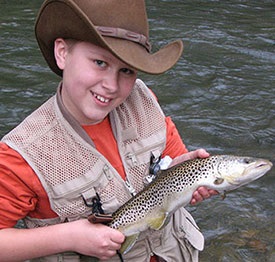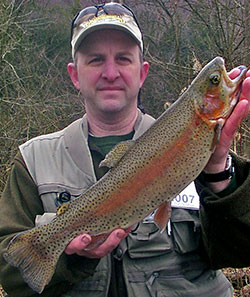 Most trout fishermen fish for reasons other than merely catching trout. Reasons such as the opportunity to see the beauty of a trout in its brighter-than-nature colors resting in a sagging landing net. The sound of gurgling water, or the silence of slow moving water through a cedar swamp are other reasons. Or, it may be the opportunity to see a deer feeding in the river. If it’s a meal the angler is looking for, a freshly fried batch of pan-size trout or a freshly grilled lunker is hard to beat.
Most trout fishermen fish for reasons other than merely catching trout. Reasons such as the opportunity to see the beauty of a trout in its brighter-than-nature colors resting in a sagging landing net. The sound of gurgling water, or the silence of slow moving water through a cedar swamp are other reasons. Or, it may be the opportunity to see a deer feeding in the river. If it’s a meal the angler is looking for, a freshly fried batch of pan-size trout or a freshly grilled lunker is hard to beat.
Early Season Trout Tactics-No matter what your reasons for trout fishing, the satisfaction is greater when you catch fish. A terrific time to fish trout is during the first month of the season. Fish slow moving water with logs, boulders or other cover. A deep, slow pool at the foot of a rapids or fast run is also a good place to zero in on. Use small spinners; no larger than a size #1. In clear water, stick to bright colors, like silver or rainbo scale. Darker waters call for Mepps Black Furys in either yellow dot or fluorescent red dot. Copper and brass are perfect for waters that are off-color, but not too dark.
Summer Tactics-As the season progresses, trout tend to move into deep holes at the foot of rapids. They’ll lay behind, or sometimes in front of, an obstruction that’s breaking the current. The key is to be able to identify, and effectively bring your lure over these pockets. The best time to catch summer trout is the first hour or two following sun-up.
The most important factor in summer trout fishing is rainfall. A heavy rainfall raises water levels, darkens water color, and puts big trout on the feed. Under these conditions, use larger spinners; sizes #2 or #3. Copper and gold blades produce best. There’s nothing better than the old reliable Mepps Aglia for it’s flash and vibration. Aglia Longs can also be effective, as can Black Furys. Tie on a Mepps XD if you are fishing fast, deep water. It’s engineered to drop deep and stay deep throughout your retrieve.
After a heavy rain, fish begin gorging themselves. Trout will move from cover to feeding positions. Often, big trout will move into shallow areas during this binge. Open water near undercut banks or other cover is prime feeding area, as are both ends of a deep hole.
 Different Techniques-Don’t follow the well worn paths. You can improve your success by casting from locations not used by everybody else. Approach a hole or run from a different angle. Or, better yet, go beyond the well beaten trails made by other anglers.
Different Techniques-Don’t follow the well worn paths. You can improve your success by casting from locations not used by everybody else. Approach a hole or run from a different angle. Or, better yet, go beyond the well beaten trails made by other anglers.
Presentation-Wade upstream so you’re facing into the current just as the trout are. Now, you’re approaching fish from their tail. Continually cast upstream and across current, bringing your lure directly downstream, or down and across. This allows it to tumble along with the current just as a trout normally sees its next meal.
One final note. Rainbow and brook trout will hit a lure when it’s traveling downstream with the current; and, also, when it’s coming upstream. On the other hand, sizable brown trout rarely, if ever, hit a lure that’s being pulled upstream with the current. With all three species, the larger fish are more apt to hit a spinner that’s tumbling downstream with the current. Keep this in mind if you’re after trophy trout.
